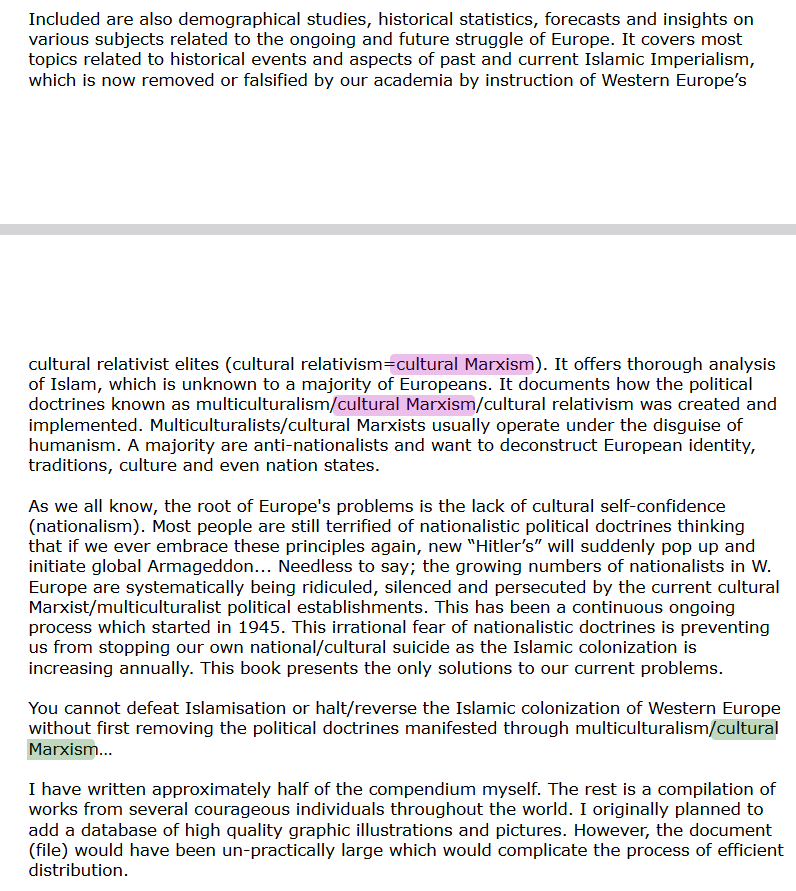 veganpizza69
14h ago
•
100%
veganpizza69
14h ago
•
100%
They need to use different tactics. I don't mean just caltrops.
 veganpizza69
15h ago
•
100%
veganpizza69
15h ago
•
100%
Ballistas affer!!
 veganpizza69
15h ago
•
92%
veganpizza69
15h ago
•
92%
🚅🚃🚃🚃🚃🚃🚃🚃🚃🚃
 veganpizza69
2d ago
•
100%
veganpizza69
2d ago
•
100%
how little most boomers care
That's precisely the conflict part. Carelessness and apathy sustain the violence. What's that recent movie... The Zone Of Interest (2023) https://www.youtube.com/watch?v=r-vfg3KkV54
 veganpizza69
2d ago
•
100%
veganpizza69
2d ago
•
100%
some kind of... food truck?
 veganpizza69
2d ago
•
100%
veganpizza69
2d ago
•
100%
End suburbia, install more cafeterias (like schools) to provide good food at a good price. Create schools and some decent incentives to get people to learn to cook.
 veganpizza69
2d ago
•
100%
veganpizza69
2d ago
•
100%
cars bring out the worst in people.
 veganpizza69
5d ago
•
100%
veganpizza69
5d ago
•
100%
POCKET GUIDE TO TIGHTENING TECHNIQUE https://www.atlascopco.com/content/dam/atlas-copco/industrial-technique/general/documents/pocketguides/9833864801_L.pdf
 veganpizza69
5d ago
•
100%
veganpizza69
5d ago
•
100%
The Reminder bot needs to be pinged for a date at the end of 2025. I would laugh if it wasn't such a dire situation.
 veganpizza69
5d ago
•
100%
veganpizza69
5d ago
•
100%
As a reminder:

 veganpizza69
5d ago
•
100%
veganpizza69
5d ago
•
100%
This implies 3 main problems:
- They're using the captured carbon for extracting more oil, which is self-defeating. That's not surprising considering who's been behind this kind of technology.
- It means allocating geothermal energy to something else. Is there a dislocation of energy supply here? Are other energy users in Iceland using fossil fuels because they can't access geothermal due to the Climeworks?
- Places with geothermal are rare, thus it's an exceptional example, not one that can be repeated easily. Having that device be powered by fossil fuels would be, again, self-defeating.
 veganpizza69
5d ago
•
100%
veganpizza69
5d ago
•
100%
Norway
Holy shit, that's some impressive conservative bullshit!
Breivik is OPENLY a 'Cultural' Christian, he made his reasons very clear. He wrote a damn manifesto, here's an analysis of it:
Christian Terror in Europe? The Bible in Anders Behring Breivik’s Manifesto
In the attempts to understand the ideology underpinning the terror attack in Norway 22nd July 2011, and the growth of far-right extremism in Europe more generally, Christianity and the uses of the Bible are a largely neglected feature. In this article, I examine the way in which the Bible is used in Anders Behring Breivik’s manifesto, arguing that this provides an important example of the role of Christianity in far-right discourse. I show that the Bible functions as a legitimating device, glossing violence as defense of a Christian Europe; as a motivational instrument, positing God as a fellow fighter; and, as an origin for Europe. The Bible is situated in a pre-modern state where its signifying powers are policed. At the same time, it is wrenched out of this solidified framework, cut up and pasted into the manifesto hypertext in order to serve as a contemporary ally to an anti-Muslim and anti-multicultural cause.
This is right up Jordan Peterson's alley.
Small edit:
a screenshot from his manifesto:
 veganpizza69
5d ago
•
100%
veganpizza69
5d ago
•
100%
I was focusing especially on the hummus.
 veganpizza69
6d ago
•
100%
veganpizza69
6d ago
•
100%
I wish food labels came with the full binomial nomenclature including the variety and subspecies.
Here's your sandwich:
- Triticum aestivum L. ssp aestivum
- Lactuca sativa L. var. crispa
- Solanum lycopersicum L. var. esculentum
- Glycine max (L.) Merr.
- Piper nigrum L.
 veganpizza69
6d ago
•
66%
veganpizza69
6d ago
•
66%
It averages out. Keep a clean record for a set interval and you get discounts.
You think I'm joking, but car insurance companies are going to do all of these things, and not for public health. Smart cars are especially big leaks of personal data.
 veganpizza69
7d ago
•
25%
veganpizza69
7d ago
•
25%
This would be an improvement with cars, not a problem with cars.
 veganpizza69
7d ago
•
100%
veganpizza69
7d ago
•
100%
“The people are right to not trust a science they can’t pronounce”
One of the basic arguments against "Ultraprocessed Fods" (UPF)... I shit you not.
Michael Pollan: If You Can't Say It, Don't Eat It : NPR
2.) If You Can't Say It, Don't Eat It
Don't buy products with more than five ingredients or any ingredients you can't easily pronounce.
 veganpizza69
7d ago
•
100%
veganpizza69
7d ago
•
100%
Privileged twits are a huge danger, yes.
Monty Python - Upper Class Twit Of The Year https://www.youtube.com/watch?v=zGxSM5y7Pfs
 veganpizza69
7d ago
•
100%
veganpizza69
7d ago
•
100%
Is the railway system for his personal use? Rail is good if it's public transport (and cargo). There was a tradition, some time ago, of rich people getting their own railways and trains. But now they have jets and yachts.
cross-posted from: https://lemmy.world/post/20824402 > Automaker's latest subscription model takes nickel-and-diming to new heights

[original thread](https://new.reddit.com/r/Damnthatsinteresting/comments/1fynux6/hurricane_milton/)
> >Humans as Agents in the Termination of the African Humid Period > > >There is great uncertainty over the timing and magnitude of the termination of the African Humid Period (AHP). Spanning from the early to middle Holocene, the AHP was a period of enhanced moisture over most of northern and eastern Africa. However, beginning 8000 years ago the moisture balance shifted due to changing orbital precession and vegetation feedbacks. Some proxy records indicate a rapid transition from wet to dry conditions, while others indicate a more gradual changeover. Heretofore, humans have been viewed as passive agents in the termination of the AHP, responding to changing climatic conditions by adopting animal husbandry and spreading an agricultural lifestyle across the African continent. This paper explores scenarios whereby humans could be viewed as active agents in landscape denudation. During the period when agriculture was adopted in northern Africa, the regions where it was occurring were at the precipice of ecological regime shifts. Pastoralism, in particular, is argued to enhance devegetation and regime shifts in unbalanced ecosystems. Threshold crossing events were documented in the historical records of New Zealand and western North America due to the introduction of livestock. In looking at temporally correlated archeological and paleoenvironmental records of northern Africa, similar landscape dynamics from the historical precedents are observed: reduction in net primary productivity, homogenization of the flora, transformation of the landscape into a shrub-dominated biozone, and increasing xerophylic vegetation overall. Although human agents are not seen as the only forces inducing regime change during the termination of the AHP, their potential role in inducing large-scale landscape change must be properly contextualized against other global occurrences of neolithization. > > https://www.frontiersin.org/journals/earth-science/articles/10.3389/feart.2017.00004/full
>Humans as Agents in the Termination of the African Humid Period >There is great uncertainty over the timing and magnitude of the termination of the African Humid Period (AHP). Spanning from the early to middle Holocene, the AHP was a period of enhanced moisture over most of northern and eastern Africa. However, beginning 8000 years ago the moisture balance shifted due to changing orbital precession and vegetation feedbacks. Some proxy records indicate a rapid transition from wet to dry conditions, while others indicate a more gradual changeover. Heretofore, humans have been viewed as passive agents in the termination of the AHP, responding to changing climatic conditions by adopting animal husbandry and spreading an agricultural lifestyle across the African continent. This paper explores scenarios whereby humans could be viewed as active agents in landscape denudation. During the period when agriculture was adopted in northern Africa, the regions where it was occurring were at the precipice of ecological regime shifts. Pastoralism, in particular, is argued to enhance devegetation and regime shifts in unbalanced ecosystems. Threshold crossing events were documented in the historical records of New Zealand and western North America due to the introduction of livestock. In looking at temporally correlated archeological and paleoenvironmental records of northern Africa, similar landscape dynamics from the historical precedents are observed: reduction in net primary productivity, homogenization of the flora, transformation of the landscape into a shrub-dominated biozone, and increasing xerophylic vegetation overall. Although human agents are not seen as the only forces inducing regime change during the termination of the AHP, their potential role in inducing large-scale landscape change must be properly contextualized against other global occurrences of neolithization. https://www.frontiersin.org/journals/earth-science/articles/10.3389/feart.2017.00004/full
 grist.org
grist.org
cross-posted from: https://sh.itjust.works/post/25282575 > >Methane spends a lot less time in the atmosphere than carbon dioxide; about 20 years after it’s released, most of it will have decayed, while carbon dioxide lingers in the atmosphere for hundreds of years. But methane also generates heat much more readily than carbon dioxide — about 80 times more in its first 20 years in the atmosphere — meaning it contributes significantly towards global warming in the short term. It is good news — sort of — because by the same token, any reductions in methane emissions will have more of an impact on the climate right away.

[source](https://www.reddit.com/r/comics/comments/1fdd5d9/alternate_universe_oc/)
 canadiandimension.com
canadiandimension.com
> >UB: To start with, we tried to argue with our book against a very dynamic treatment dealing with ecological crisis: what we call green capitalism, or the green economy, or ecological modernization of capitalism. Which is: we have a problem with the combustion engine so it should be the electric engine. This will not be sufficient, we know, because the resources have to come from the South and there is still the space problem. > > >We prepare our argument of solidary mode of living against a strong expectation of the green side of the government in Germany and Austria that we don’t have to question our imperial mode of living: we green it a bit. There’s a greening ecological modernization, if you like. I’m sure in Canada you have similar debates. Even many movements believed it; not the radical movements, but many NGOs and so on. > > >We argue: no, if we take the problem seriously: that we have to get rid of the capitalist growth imperative, that we have to get rid of the world resources market, this enormous flow from the South to the North. We need principles but also to take seriously experiences and then certain policies towards the solidary mode of living. This chapter is a first attempt. It’s very comprehensive and it was also criticized—which is why we’re writing another book. > > >But you point at a distinction which to us seems crucial: the distinction between the subjective preconditions and the objective preconditions. We don’t accept an environmentalist discourse that says “it’s just behaviour, it’s just the consciousness.” But we also don’t say, “it’s just the policy framework.” We say that if we want a real mobility transition, but only from the combustion engine to the electric engine, we need an understanding via conflicts and via learning processes that the car is not only not necessary but it’s not attractive. **It’s a struggle over subjectivities that what we call the “automobile imperial mode of living” or “imperial automobility” is not any longer possible.** > > >The objective conditions are the other infrastructures, the other production systems, which means also a loss of jobs. I work a lot with trade unions on this. A reduction of the car industry means to rethink how the production of mobility is organized and to take the power from the automotive industry and to produce much more the means for public transport. The argument from the automotive industry is always: “There is job loss.” And the unions are on their side. It’s necessarily to convince them to have good public transport—which does not mean planes but a good train and bus system—means also to create jobs. This is the subjective and objective. > > >Then, we have some principles. One principle, since we come from critical theory, is that the care principle—a principle to organize society carefully: to have care for yourself, for others, for nature, for society—should overrule the profit principle of the large companies. At the large scale of the automotive industry and military, the profit motive turns into political power. We have to reduce certain production but we also have to change property relations. > > >Another principle beside this care principle is to rebuild the public sector. Of course, we have many problems with the public sector. Corruption, inefficiency: we are aware of these things. But to guarantee basic provisioning, we need a strong public sector because this can be made responsible. When it comes to pensions, when it comes to health, when it comes to education, the private principle is “who has the money?” The public principle is that it’s a social right. > > >Finally, we argue that we need strong social movements, which are usually the indicators of the need of radical change. We have this wonderful movement in Germany to leave the coal in the soil and the anti-nuclear movement that has decades of experiences and work. At the end, it’s political contestation: it needs to be armoured—to draw on Gramsci—with coercion and the finances of the state. It needs a macro perspective. It’s not enough to remain within a niche. But we defend that the radical innovation usually comes from the edges. For example, we don’t argue “we have to wait until the majority wants it.” We need these starting points of an emancipatory politics, which means criticizing domination in a manyfold sense.
 canadiandimension.com
canadiandimension.com
>UB: To start with, we tried to argue with our book against a very dynamic treatment dealing with ecological crisis: what we call green capitalism, or the green economy, or ecological modernization of capitalism. Which is: we have a problem with the combustion engine so it should be the electric engine. This will not be sufficient, we know, because the resources have to come from the South and there is still the space problem. >We prepare our argument of solidary mode of living against a strong expectation of the green side of the government in Germany and Austria that we don’t have to question our imperial mode of living: we green it a bit. There’s a greening ecological modernization, if you like. I’m sure in Canada you have similar debates. Even many movements believed it; not the radical movements, but many NGOs and so on. >We argue: no, if we take the problem seriously: that we have to get rid of the capitalist growth imperative, that we have to get rid of the world resources market, this enormous flow from the South to the North. We need principles but also to take seriously experiences and then certain policies towards the solidary mode of living. This chapter is a first attempt. It’s very comprehensive and it was also criticized—which is why we’re writing another book. >But you point at a distinction which to us seems crucial: the distinction between the subjective preconditions and the objective preconditions. We don’t accept an environmentalist discourse that says “it’s just behaviour, it’s just the consciousness.” But we also don’t say, “it’s just the policy framework.” We say that if we want a real mobility transition, but only from the combustion engine to the electric engine, we need an understanding via conflicts and via learning processes that the car is not only not necessary but it’s not attractive. **It’s a struggle over subjectivities that what we call the “automobile imperial mode of living” or “imperial automobility” is not any longer possible.** >The objective conditions are the other infrastructures, the other production systems, which means also a loss of jobs. I work a lot with trade unions on this. A reduction of the car industry means to rethink how the production of mobility is organized and to take the power from the automotive industry and to produce much more the means for public transport. The argument from the automotive industry is always: “There is job loss.” And the unions are on their side. It’s necessarily to convince them to have good public transport—which does not mean planes but a good train and bus system—means also to create jobs. This is the subjective and objective. >Then, we have some principles. One principle, since we come from critical theory, is that the care principle—a principle to organize society carefully: to have care for yourself, for others, for nature, for society—should overrule the profit principle of the large companies. At the large scale of the automotive industry and military, the profit motive turns into political power. We have to reduce certain production but we also have to change property relations. >Another principle beside this care principle is to rebuild the public sector. Of course, we have many problems with the public sector. Corruption, inefficiency: we are aware of these things. But to guarantee basic provisioning, we need a strong public sector because this can be made responsible. When it comes to pensions, when it comes to health, when it comes to education, the private principle is “who has the money?” The public principle is that it’s a social right. >Finally, we argue that we need strong social movements, which are usually the indicators of the need of radical change. We have this wonderful movement in Germany to leave the coal in the soil and the anti-nuclear movement that has decades of experiences and work. At the end, it’s political contestation: it needs to be armoured—to draw on Gramsci—with coercion and the finances of the state. It needs a macro perspective. It’s not enough to remain within a niche. But we defend that the radical innovation usually comes from the edges. For example, we don’t argue “we have to wait until the majority wants it.” We need these starting points of an emancipatory politics, which means criticizing domination in a manyfold sense.
\#beanfluencer
(-- dlal)
 sentientmedia.org
sentientmedia.org

Source: https://masto.ai/@vagina_museum/113034287254264640 >The menstrual product ad trope of a jubilant woman going rock climbing or bungee jumping or doing athletic feats is associated with the 1980s, but it's in fact way older than that. This menstrual product ad from the late 19th century shows a very jubilant woman going cycling. > >The pads in the advert, which apparently help you cycle around dressed like a triumphant Roman, include "pasteurised peat". Peat moss, also known as sphagnum, was a popular choice for homemade menstrual pads as the moss can absorb up to 20 times its weight in moisture. > >Image courtesy of Courtesy of Musée Carnavalet.

Source: https://masto.ai/@vagina_museum/113034287254264640 >The menstrual product ad trope of a jubilant woman going rock climbing or bungee jumping or doing athletic feats is associated with the 1980s, but it's in fact way older than that. This menstrual product ad from the late 19th century shows a very jubilant woman going cycling. >The pads in the advert, which apparently help you cycle around dressed like a triumphant Roman, include "pasteurised peat". Peat moss, also known as sphagnum, was a popular choice for homemade menstrual pads as the moss can absorb up to 20 times its weight in moisture. >Image courtesy of Courtesy of Musée Carnavalet.





